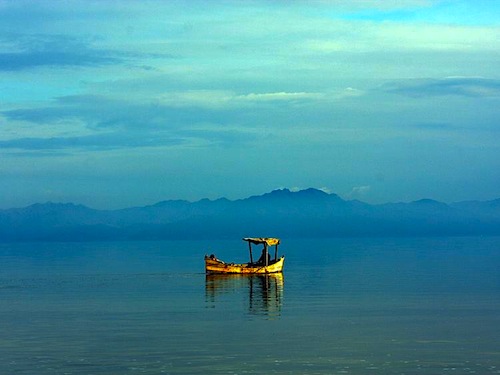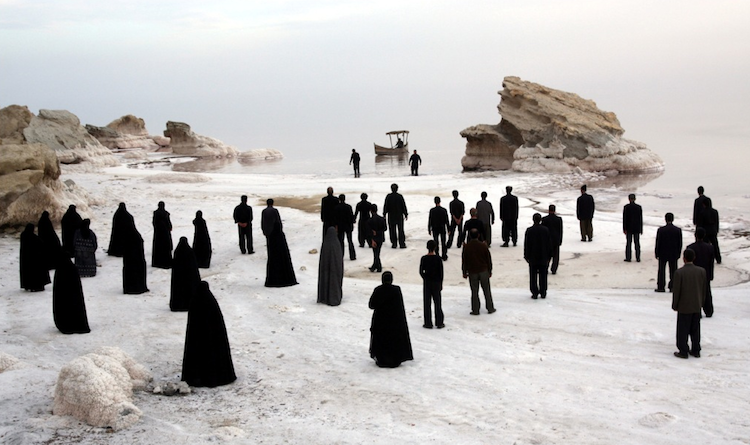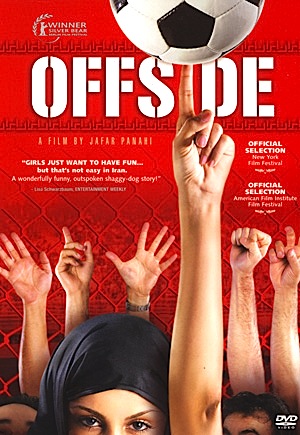By Joe Bendel. It is so tragically appropriate that the latest film from unjustly persecuted Iranian film directors Mohammad Rasoulof and Jafar Panahi uses tears as a major plot device, that it is almost embarrassing to point out the aptness. However, it is the repressive Iranian government that should be ashamed. It has sentenced both filmmakers to six year prison terms, on the flimsiest of pretexts. To its credit, the recently wrapped Berlin International Film Festival went out of its way to protest their plight, holding Panahi’s invited place on the Berlinale jury vacant, while screening five of his films in various festival sections. Now the Asia Society follows suit with an equally timely retrospective Panahi’s work, starting this Friday with Rasoulof’s The White Meadows, a strange and unsettling cinematic fable edited by Panahi.
The water has never been saltier and the people living on Lake Urmia’s sandy white isles have never been so miserable. A karmic hand seems to be at work. Seeking relief from their sorrow, they turn to Rahmat, a tear collector, who gathers his watery harvest during their funerals, confessions, and inquisitions. However, after leaving one grieving family, Rahmat is surprised to find a stowaway on his small boat, the young Nissim, who has set out on a truly archetypal quest to find his prodigal father.

As Rahmat and his unexpected apprentice travel from one island to another, Meadows subtly grows ever more fantastical and sad. Indeed, its episodic nature seems like a conscious attempt to evoke the spirit of ancient epics like The Odyssey, while keeping its exact time-frame deliberately vague.
Though he functions as an enigmatic journeyman, Hasan Pourshirazi’s Rahmat is still fascinating to watch as he slowly yields up his mysteries. As young Nissim, Younes Ghazali shows talent beyond his years, effectively serving as the audience’s proxy, viscerally and believably expressing horror at the various injustices he witnesses.
Totally absorbing despite its unhurried pace, Meadows is a testament to the filmmaking talents of director Rasoulof and editor Panahi. As lensed by cinematographer Ebrahim Ghafouri, it is a visually stunning film, often utilizing arresting wide angle shots of its black-clad figures, standing out as contrasting specks against the blinding sunlight and Urmia’s eerie white sand and saltwater vistas.
Given the prevalence of tears and suffering in Meadows, it is hard not to read additional meaning into its story. Rasoulof wisely keeps the political allegory largely shrouded (though evidently not obscure enough). Still, there seem to be clear parallels between the bad karma the islanders are suffering and the sins of the Islamic Revolutionary government. Certain critiques of Iranian society are also inescapable, especially its rampant misogyny. Indeed, when a beautiful woman dies terribly young, one Islander tells Rahmat it is for the best, lest she should inspire unfulfilled lust in the men. Also worth noting, Meadows scrupulously adheres to Iran’s stringent regulations forbidding all forms of physical contact between men and women on-screen.
The standout film at last year’s Tribeca Film Festival, Meadows is a masterfully crafted work that resists lazy categorization (such as “political allegory” or “Arabian fantasy”). Filmed under difficult circumstances, it is also recommended beyond reasons of its considerable cinematic merits. Clearly, the current Iranian regime would like the outside world to forget Rasoulof, Panahi, and their films. Instead, make a point of attending White Meadows at Asia Society this Friday (2/25) and return for Panahi’s films in the coming days and weeks to enjoy their art, but also to remain mindful of their perilous situation.
Posted on February 22nd, 2011 at 12:49pm.

